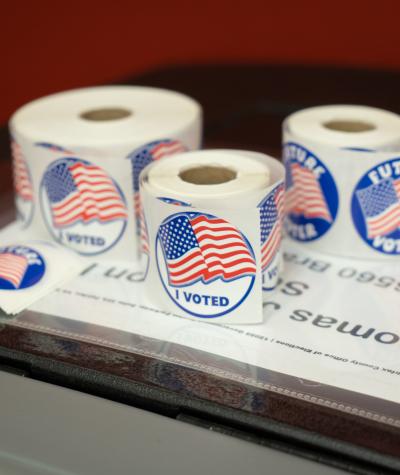Felony disenfranchisement laws, which take away someone’s freedom to vote if they have been convicted of a felony, are the biggest remaining obstacle to a truly inclusive and equitable democracy in America.
These laws proliferated in the United States as an intentional scheme to strip Black Americans of their freedom to vote and continue to disproportionately impact Black and brown voters.
Today, nearly 5 million people nationwide are disenfranchised due to a felony conviction, and almost 18 million more may be effectively disenfranchised because of state barriers like confusing laws, onerous paperwork requirements, or fear of being prosecuted.
Additionally, tens of thousands of eligible voters who haven’t even been convicted of a crime are incarcerated in county jails, but are unable to participate in our democracy because of the everyday barriers posed by incarceration.
This is a direct affront to the ideals of our democracy — and local and national advocates are fighting back. On December 6, Rep. Ayanna Pressley and Sen. Peter Welch introduced the Inclusive Democracy Act, which would dramatically advance our democracy by guaranteeing the right to vote in federal elections for Americans regardless of a criminal conviction.
"Felony disenfranchisement is the biggest remaining obstacle to a true democracy in America."
— Campaign Legal Center (@CampaignLegal) December 6, 2023
CLC's @DaniLang_Votes spoke at today's press event on the introduction of the Inclusive Democracy Act, which would protect voting access for people with felony convictions. 1/ pic.twitter.com/omBcJ1Mwdr
Crafted in close consultation with affected individuals, the Inclusive Democracy Act would not only guarantee the right to vote in theory, but also mandate access to the ballot in practice.
First, the bill requires state and federal entities to notify individuals with a criminal conviction of their right to vote. Second, it ensures that all eligible individuals can effectively participate in the democratic process, including those who are incarcerated, by providing voter registration and vote-by-mail opportunities to those in the government’s custody.
Crucially, the bill was crafted with the following principle in mind, which also animates CLC’s Restore Your Vote program: Ensuring that we are advancing democracy not just for those impacted but with those directly impacted too. To that point, CLC sees the impact of felony disenfranchisement every day in the lives of our clients, and this legislation reflects their lived experience.
This legislation is about the grandmother helping to raise her grandchildren having a say in how her tax dollars are spent on public schools. It’s about the veteran trying to make sure their services and benefits aren’t slashed. It’s about the older person who has never before had the opportunity to vote trying to reintegrate into society and voting for representatives who support funding to reintegration services.
It’s about all of us, because our vote is our voice, and we don’t have a true democracy unless everyone can access the freedom to vote.
This legislation is also about democratic accountability. Elected officials make consequential decisions that directly impact incarcerated and formerly incarcerated voters every day; legislators make the laws that incarcerated voters are charged with breaking, district attorneys prosecute their cases, and law enforcement police them on the streets.
Incarcerated voters’ exposure to the criminal legal system gives them a major stake in the outcome of public policy, and their participation is crucial if the ballot box is truly to be a site where we hold our elected officials accountable.
While we have seen some progress in rights restoration, most states still have work to do to eliminate laws that exclude people with felony convictions from voting. We thank the advocates and organizers, especially Black and brown organizers who themselves have had contact with the criminal legal system, who are tirelessly working to eliminate criminal disenfranchisement.
Finally, we urge the U.S. Congress to pass this transformative legislation and push us to a more fair, representative, and inclusive democracy.

